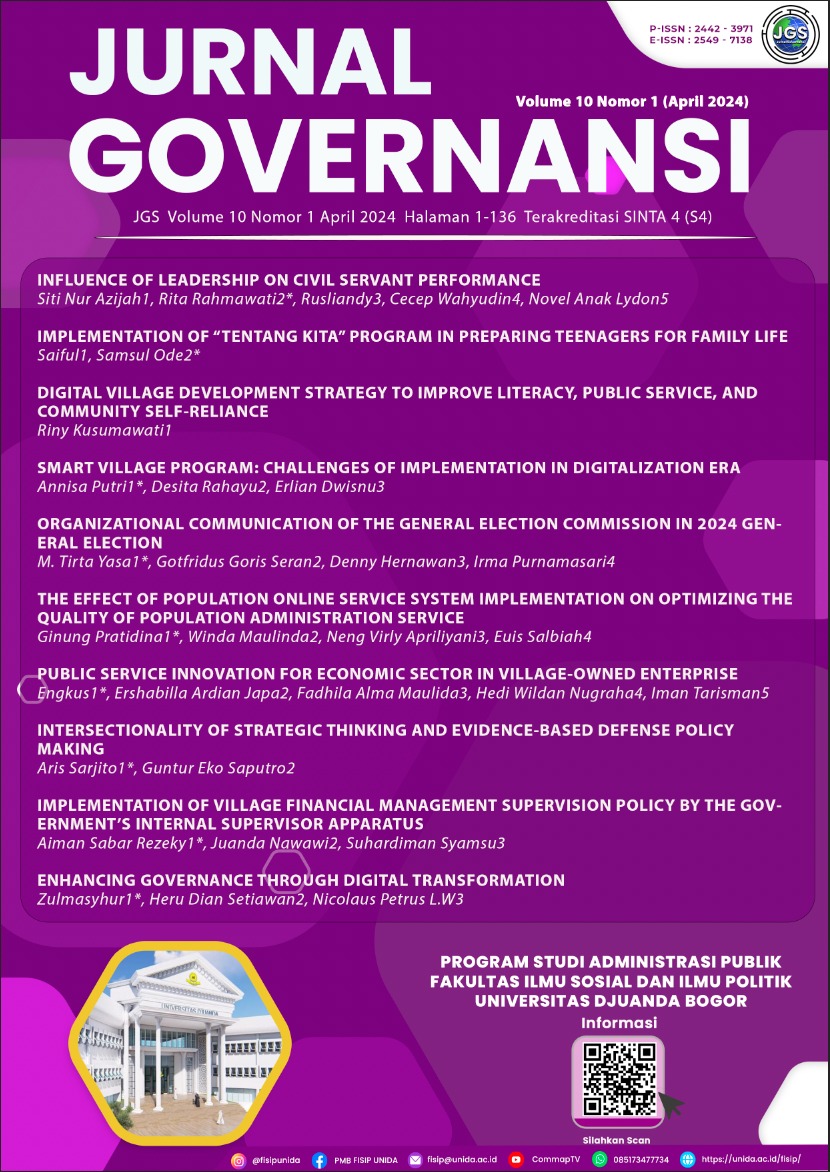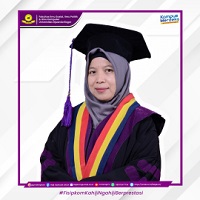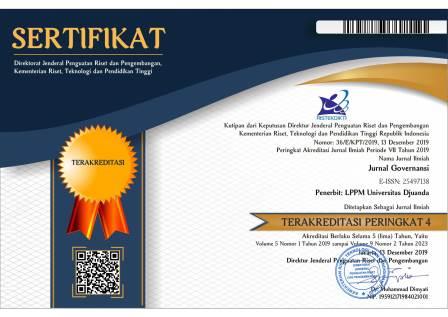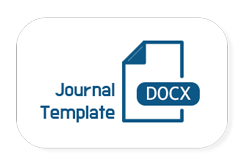DIGITAL VILLAGE DEVELOPMENT STRATEGY TO IMPROVE LITERACY, PUBLIC SERVICE, AND COMMUNITY SELF-RELIANCE
DOI:
https://doi.org/10.30997/jgs.v10i1.9790Keywords:
Community Self-Reliance, Digital Savvy, Digital Village, Literacy, Public ServiceAbstract
Digital Village is a program that empowers communities to utilize digital technology and the internet to unlock the potentials of rural areas, market products, and increase access to information services. By increasing their digital literacy, individuals can use internet access to improve their quality of life, including environmental management, economics, education, management of the educational environment, innovation opportunities, and social stability. The emergence of the Industrial Revolution 4.0 and the challenges posed by the COVID-19 pandemic have caused significant changes in human behavior and habits. This transition is mainly influenced by advances in information technology and communications and the implementation of policies such as social distancing to mitigate the spread of COVID-19 information. Given these infrastructure needs, digitalization in rural areas presents a formidable challenge. This research aims to provide an in-depth overview of the public service process and application concepts that support making it easier for village officials to carry out administrative tasks that can be accessed via smartphone. It used qualitative descriptive research methods, followed by IBM SPSS reliability testing. This research data was collected through observation, interviews, and documents. The research results show that the Digital Village initiative uses technological information to improve the management of craft village businesses, market discovery, and identify business opportunities. In addition, Digital Village collaborates with various stakeholders at five levels to improve regional development programs. In the long term, the Digital Village program plays an essential role in increasing digital literacy, encouraging self-reliance, and improving the welfare of community in West Java.
References
Arsana, I. N. A., Cs, M., Waas, D. V., Si, S., Cs, M., & Meinarni, N. P. S. (2021). Pelatihan Dasar Komputer dan Teknologi Informasi Bagi Perangkat Desa Kukuh. Jurnal WIDYA LAKSMI, 1(1), 6.
Bawono, I. R., & Setyadi, E. (2019). Optima-lisasi Potensi Desa Di Indonesia. Grasindo.
Emillia Octavia. (2019). Desa Digital: Potensi dan Tantangannya. Buletin APBN Vol. IV. Ed. 08, Mei 2019, 8-11.
Eprilianto, D. F., & Pradana, G. W. (2019). Digital Inovasi Sektor Publik: Efektivitas Kolaborasi dalam Imple-mentasi Inovasi Desa Digital. 10, 19.
Ghozali, L., & Latan, H. (2015). Konsep, Teknik, Aplikasi Menggunakan Smart PLS 3.0 Untuk Penelitian Empiris (2nd ed.). Badan Penerbit Universitas Diponegoro.
Hasya, S., & Wikusna, W. (2020). Aplikasi Berbasis Web Desa Digital Bandung Juara pada Modul Pengaduan Warga. e-Proceeding of Applied Science, 1, 7.
Mahendra, G. S., & Nugraha, P. G. S. C. (2021). Pelatihan perangkat desa dalam penggunaan sistem pengaduan online berbasis web (ec-resolver) untuk menuju desa digital. JMM (Jurnal Masyarakat Mandiri), 5(3), 918-929.
Nugroho, L. (2021). KONSEP PEMBA-NGUNAN DAN PENGEMBANGAN DESA DIGITAL (p. 157).
Poltak, H., Muhfizar, Sirait, J., Ismail, dan Ristiani (2022) Peningkatan Kemampuan Pemasaran dan Pembukuan Sederhana di Desa Inovasi Kelautan dan Perikanan. APTEKMAS, 5(2):83-90.
Program Studi Ilmu Politik, FISIP Universitas Brawijaya Malang, & Setya Yunas, N. (2019). Implementasi Konsep Penta Helix dalam Pengembangan Potensi Desa melalui Model Lumbung Ekonomi Desa di Provinsi Jawa Timur. Matra Pembaruan, 3(1), 37–46. https://doi.org/10.21787/mp.3.1.2019.37-46
Soleh, A. (2017). STRATEGI PENGEM-BANGAN POTENSI DESA.
Supriyanto, A., & Hana, K. F. (2020). Strategi Pengembangan Desa Digital Untuk Meningkatkan Produktivitas UMKM. BISNIS: Jurnal Bisnis dan Manajemen Islam, 8(2), 199-216.
Syaharuddin, S., & Ibrahim, M. (2017). Aplikasi Sistem Informasi Desa Sebagai Teknologi Tepat Guna Untuk Pendataan Penduduk Dan Potensi Desa. JMM (Jurnal Masyarakat Mandiri), 1(1), 60.
Witarsa, R., Mufarizuddin, & Sularno. (2021). Penyuluhan dan Musyawarah Desa Khusus Penerima Bantuan Langsung Tunai Dana Desa. Community Development Journal, 2(2), 410–417.
Yamulia Hulu, R. H. (2018). Pengelolaan Dana Desa dalam Pemberdayaan Masyarakat Desa. Jurnal Pendidikan Ilmu-Ilmu Sosial, 146-154.
Wahyudin, C., Oetje Subagdja, & Abubakar Iskandar. (2023). DESIGN OF COLLABORATIVE GOVERNANCE MODEL IN HANDLING PLASTIC USE REDUCTION. Jurnal Governansi, 9(2), 151–162. https://doi.org/10.30997/ jgs.v9i2.8004
Zulfa, A. A., Therasari, A., E Syahrudin, Oktavinia, K., Bhakti, M. T. P., Salbiah, E., & Wahyudin, C. (2024). Transformasi Digital dalam Pelayanan Pembuatan Surat Pindah Datang. Karimah Tauhid, 3(2), 1724–1735. https://doi.org/10.30997/karimahtauhid.v3i2.11906.
Downloads
Published
How to Cite
Issue
Section
License
Copyright (c) 2024 Riny Kusumawati

This work is licensed under a Creative Commons Attribution-ShareAlike 4.0 International License.
Authors who publish with Jurnal Governansi agree to the following terms:
- Authors retain copyright and grant the journal right of first publication with the work simultaneously licensed under a Creative Commons Attribution 4.0 International License that allows others to share the work with an acknowledgement of the work's authorship and initial publication in Jurnal Governansi.
- Authors are able to enter into separate, additional contractual arrangements for the non-exclusive distribution of the journal's published version of the work (e.g., post it to an institutional repository or publish it in a book), with an acknowledgement of its initial publication in Jurnal Governansi.
- Authors are permitted and encouraged to post their work online (e.g., in institutional repositories or on their website) prior to and during the submission process, as it can lead to productive exchanges, as well as earlier and greater citation of published work.




















